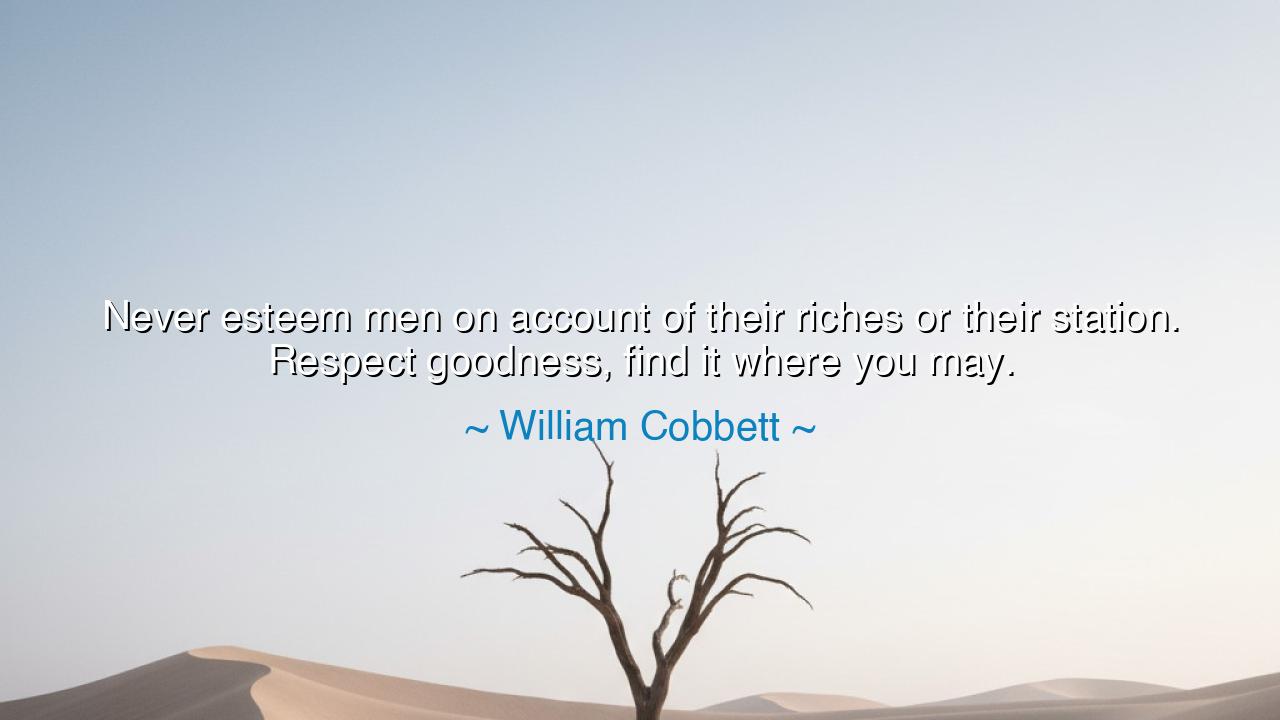
Never esteem men on account of their riches or their station.
Never esteem men on account of their riches or their station. Respect goodness, find it where you may.






Hearken, O seekers of virtue and lovers of truth, to the words of William Cobbett, who declared: “Never esteem men on account of their riches or their station. Respect goodness, find it where you may.” In this brief yet mighty utterance lies the heart of moral wisdom—the ancient recognition that true worth lies not in wealth or position, but in the goodness of the soul. For gold can glitter upon the wicked as easily as upon the just, but goodness—humility, courage, kindness, and honesty—shines with a light no power can counterfeit.
From the dawn of time, humanity has wrestled with the temptation to measure worth by the illusions of status. In the courts of kings and the markets of empires, men have bowed before titles and treasures, forgetting that character, not fortune, defines the greatness of a person. Cobbett, writing in an age of social division and rising industrial wealth, sought to awaken the conscience of his generation. He called for the restoration of honor to laborers, farmers, and the common folk whose integrity and toil sustain the world—reminding us that virtue dwells as readily in a humble cottage as in a royal palace.
Consider the story of Diogenes the Cynic, who lived in a barrel and owned nothing but his wisdom. When Alexander the Great, ruler of the known world, approached him and asked what favor he could grant, Diogenes replied, “Stand out of my sunlight.” Though one held armies and the other only truth, it was the beggar who stood free, unenslaved by wealth or fear. Even Alexander, awed by the philosopher’s courage, declared, “If I were not Alexander, I would be Diogenes.” Thus history bears witness that respect must be given to goodness, not grandeur.
Cobbett’s warning is not a condemnation of success, but a call to discernment. Riches and rank are not evil in themselves; they become corrupt only when mistaken for measures of virtue. Wealth can be used to heal or to harm, power can uplift or destroy—but neither defines the soul of the one who wields them. The farmer who shares his bread, the teacher who shapes young minds, the healer who labors unseen—these stand closer to the divine than the tyrant draped in gold. Goodness alone is the true currency of heaven.
The ancients understood this truth well. In the scriptures of many peoples, it is written that pride leads to downfall, and that the meek and righteous shall inherit the earth. The philosopher Seneca, tutor to emperors, wrote: “He is a great man who is good, not he who is rich.” Even the great Confucius taught that a noble heart, not noble birth, determines the worth of a person. Thus across time and culture, the wisdom is one: esteem character over circumstance, virtue over vanity.
The lesson is clear: to respect goodness wherever it is found is to see the divine in every form it takes. The poor man who gives from his hunger, the stranger who comforts the lost, the child who speaks truth without fear—each reveals a fragment of the sacred. To esteem only the rich or the powerful is to blind oneself to the quiet heroism that surrounds us daily. Goodness is the common language of the soul, understood by all who live with compassion and integrity.
Practical action flows from this wisdom: judge not by wealth, title, or reputation, but by deed and heart. Offer respect freely to those who act with honor, regardless of their station. Seek to cultivate goodness within yourself, that you may become worthy of the same respect you give to others. Let your admiration be reserved not for the mighty, but for the kind, the honest, and the just.
O seeker of understanding, remember this: riches perish, positions fade, but goodness endures beyond death itself. Let the words of William Cobbett be the compass of your heart: never bow to the glitter of gold or the echo of fame, but bend your spirit in reverence to virtue, wherever it blooms. In doing so, you honor the true nobility of humanity—the quiet majesty of a good heart, which outshines all crowns and conquers all time.






AAdministratorAdministrator
Welcome, honored guests. Please leave a comment, we will respond soon